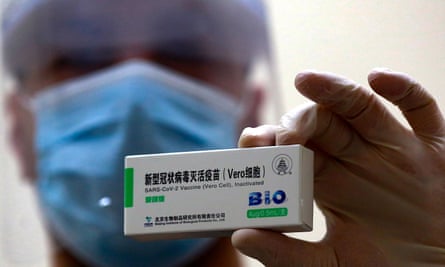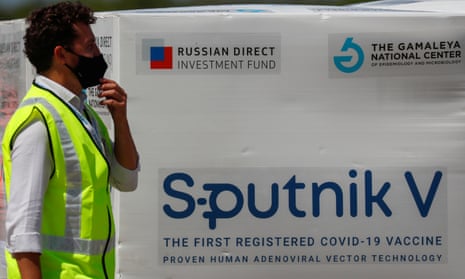“Today it is easier to get a nuclear weapon than to get a vaccine,” the Serbian president, Aleksandar Vučić, declared in January. He was bragging. The Balkans country had just received its first shipment of almost 1m Covid-19 vaccine doses from Sinopharm, a state-owned Chinese pharmaceutical company.
Since then, Serbia has augmented its stockpile with tens of thousands of shots of Russia’s Sputnik V, signed an agreement to build a bottling plant for the Russian vaccine and now boasts the fastest vaccination rate in continental Europe.
Belgrade is flush enough that is has started practising its own vaccine diplomacy, giving thousands of doses to neighbouring North Macedonia, with others in its orbit such Montenegro and Republika Srpska expecting to receive donations soon.
As the race to administer Covid-19 inoculations has ramped up this year, so have efforts to use the vaccines as instruments of influence. India entered the fray in February by giving away millions of doses to its neighbours in south Asia, where it has been competing for diplomatic sway with China. Beijing has announced a flurry of free doses over recent weeks to 13 countries, and say it plans to provide vaccines to 38 more. Moscow has capitalised on delays in the EU’s programme to sell its own vaccine to Hungary – even though the Russian formulation still awaits the bloc’s regulatory approval.
In a market of extreme scarcity, with vaccination yet to begin in 130 countries, states such as Serbia are emerging as early leaders in the vaccination race, leveraging geopolitical competition – along with a willingness to smooth out regulatory hurdles – to access millions of doses fast.
“Vaccine procurement is symbolic of Serbia’s foreign policy strategy,” said Vuk Vuksanovic, a researcher at the London School of Economics and the Belgrade Centre for Security Policy. “Balance and pit the west against non-western powers like Russia and China, to see from which side you will score a better bargain.”
Conspicuously missing so far from the fray of overseas deals and donations have been western governments, which are consumed with vaccinating their own populations first and have preferred to channel vaccine aid into multilateral schemes such as Covax, the sharing mechanism that will start by supplying about 3% of the most vulnerable people in middle- and lower-income countries over the next six months.
By then, countries such as the UK, US and Canada expect to be on their way to herd immunity, along with a clutch of other wealthy countries that have bought up most of the supply of western vaccines that will be produced in 2021. The divide is a diplomatic opportunity, and some foreign capitals are taking it.
“The vaccine nationalism of western countries created the space for these other countries to practise vaccine diplomacy,” said Yanzhong Huang, a senior fellow for global health at the Council on Foreign Relations thinktank.
While China sent its Serbian ambassador to the airport ceremony marking the arrival of Sinopharm doses, and Vladimir Putin uses diplomatic summits to hawk Sputnik V, Washington, London and European capitals have preferred to let pharmaceutical companies take the spotlight, and largely allowed them to decide where vaccines go and in what quantities. With the exception of AstraZeneca, most have supplied the bulk of their doses so far to the highest bidders.
“Pfizer, Moderna too, they’re here to make a profit,” said Agathe Demarais, global forecasting director at the Economist Intelligence Unit. “Companies do not do diplomacy, in theory. They have short-term goals. So it’s very different when a vaccine is marketed by a government over a company.”
An illustration of the difference is the Oxford/AstraZeneca vaccine made by the Serum Institute of India that Delhi gifted to governments in south Asia this month. The formulation was developed by a British university, in collaboration with a UK-Swedish company, but went out prominently branded: “Gift from the people and government of India.”
Any quid pro quo for vaccine aid is not likely to be immediate, analysts say. “Obviously Russia and China are not entering emerging countries saying you need to give us something back,” said Demarais. “But in the long term it will pay dividends. And the Russian and Chinese leaderships understand the pandemic is going to be with us for a long time to come.”
China specialists are pointing to the way it has rolled vaccines into its belt and road initiative framework, using summits with Middle East and African countries to offer preferential access to jabs alongside investments in highways, ports, 5G grids and renewable energy. Last year, while Washington was trumpeting an “America first” response to the pandemic, Beijing was making high-profile deals to trial, produce and sell vaccines in Latin America, deep inside the US’s traditional sphere of influence.

In a century likely to see several more pandemics, Covid-19 vaccines are providing a foothold for countries’ wider health industries. Jordan, a close US ally in the Middle East, has for decades sourced most of its routine vaccines from US companies. But with Sinopharm’s formulation forming the backbone of its Covid-19 vaccination programme, health experts in Jordan say they are having a fresh look at Chinese medical products across the board.
“From now on we’ll look favourably if a Chinese company comes and says: we have a good vaccine for diphtheria or polio or hepatitis,” said Najwa Khoury-Boulos, a distinguished professor of infectious diseases, who advises the government on the pandemic. “We may not change what we buy, but we’d look at it with more respect than before.”
Russian and Chinese companies have also been more willing than their western counterparts to strike licensing deals to allow manufacturers in places such as Indonesia, the United Arab Emirates and Malaysia, to partly or fully produce Covid-19 vaccines themselves. Last week the World Health Organizaton and Unicef put out a statement pleading for western companies to make more such deals, which may mean less profit in the long term but more vaccines sooner for societies that badly want them.
For public health activists such as Achal Prabhala, the diplomatic machinations of such deals are beside the point. With relatively unambitious domestic vaccination targets compared with the west, Russia and China have the capacity to export lifesaving vaccines in the middle of an acute pandemic – and are doing so.
“Whatever the Russian and Chinese motives are for doing this, I don’t know and don’t necessarily care,” said Prabhala, a fellow of the Shuttleworth Foundation. “If the vaccines work and are affordable and available and they’re being aggressively pushed to countries who are happy to take them – who cares if it burnishes China’s image or softens Russia’s in the world?”
